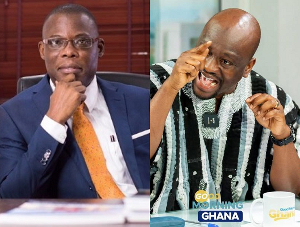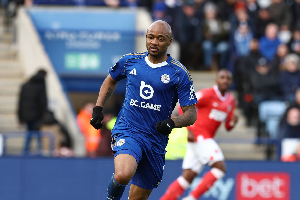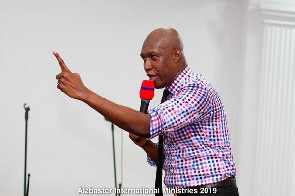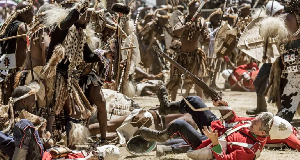We want to acquaint our general readership with profound statements made by influential world figures including writers, historians, politicians, political activists, diplomats, scholars, etc., about Nkrumah and his vision. These go to the heart of our contention that Nkrumah was/is a global phenomenon or sensation. We continue from Part 1:
FREDERICK COOPER: “There is a particular poignancy to the history of Ghana because it was the pioneer. Kwame Nkrumah was more than a political leader; he was a prophet of independence, of anti- imperialism, of Pan- Africanism.”
SEKOU TOURE: “[Kwame Nkrumah] A Universal Man…The Greatest African”
THOMAS HODGKIN: “Nkrumah’s radical Pan-Africanism had an influence on the attitudes and behavior of a substantial body of people.”
ERIC WALBERG: “[KWAME NKRUMAH] The Greatest Africa.”
AMA BINEY: “Nkrumah was central to the major debates and issues of the decolonization period of the 1950s and the 1960s.”
KWAME BOTWE-ASAMOAH: “One of the world’s historical personalities in the twentieth century.”
OBED ASAMOAH: “Ghana was instrumental at the United Nations and other international fora in spearheading the adoption of a number of measures against the colonial and racist presence in Africa; most notably, General Assembly Resolution 1514 (XV) of 1960 on the granting of independence to colonial territories and Resolution 1716 at the 17th Session of the General Assembly in 1962 requesting Member States separately or collectively to apply diplomatic and economic sanctions including an arms embargo against South Africa as well as the establishment of the UN Special Committee on Apartheid which was assigned responsibility for reviewing UN policies on South Africa and assessing the extent of their effectiveness.
“INDEED, TO AN EXTENT THAT NONE CAN GAINSAY AND TO WHICH THE UNPRECEDENTED ACCESSION OF 17 AFRICAN COUNTRIES TO INDEPENDENCE IN 1960 ALONE BEARS TESTIMONY, IT IS LARGELY TO THE CREDIT OF THE LIBERATION POLICY PURSUED BY GHANA UNDER NKRUMAH THAT THE ACCELERATION OF THE PROCESS OF DECOLONIZATION IN SOUTHERN AND EASTERN AFRICA OWED ITS SUCCESS…”
NATHAN ALBRIGHT: “King's famed admiration for Gandhi’s leadership in nonviolent rebellion was not isolated. He [Martin Luther King, Jr.] drew inspiration from Kwame Nkrumah, who led Ghana to peaceful independence.”
GENERAL J.A. ANKRAH: “Nkrumah’s place in African History had been assured.”
KOFI HADJOR: “Nkrumah is a reminder not of what Africa is, but of what Africa must become.”
KWAME ARHIN: “His political achievements in Ghana served as a model for African nationalists elsewhere on the continent…He was a pre-eminent founder of the movement for African unity; more than any other African leader of his time, he symbolized the black man’s self-identity and pride in his race. His name shall endure as the leading emancipator of Ghana, the leading protagonist of African independence and unity, and a statesman of world stature of the twentieth century.”
ABRONI K. THOMAS: “Nkrumah will continue to stand tall in the history of world leaders…His image has been looming larger ever since he shot into the limelight in 1949; and his renown is unmatchable…Nkrumah’s monumental contributions to world politics are beyond doubt.”
ALI MAZRUI: “[KWAME NKRUMAH] Ghana’s Founding Father.”
YAO GRAHAM: “Nkrumah's leadership and rallying role in African affairs went well beyond his vision and theorizing. Importantly it included support for national liberation movements. This support embodied a unity of his Pan-Africanism and commitment to anti-colonial independence as a necessary precondition for the continent's unity and progress.”
TAJUDEEN ABDUL-RAHEEM: “It is a testimony to Nkrumah’s success that 40 years after he was overthrown Ghanaian governments and leaders will still be judged (and judge poorly) against him. Even his enemies are forced to acknowledge him as a true national leader and statesman who was genuinely committed to the welfare of the people of Ghana and Africa…Time they say is a final arbiter. The ideas that Nkrumah lived and died for continue to reverberate across the continent.”
ISSA G. SHIVJI: “But enough of humiliation. Everywhere Africans are harking back to the self-respect and dignity that the struggle for independence gave them. Our young intellectuals are writing PhDs on the Nkrumahs and Nyereres…We shall go beyond the Pan-Africanist liberation of the continent to the social emancipation of humankind. It is in such debates and dialogues that we will nurture our new George Padmores and Du Bois, Nkrumahs and Nyereres, Fanons and Cabrals.”
EBOU FAYE: “Dr Kwame Nkrumah: Remembering Africa’s Most Influential and Greatest in the 21st Century."
JUNE MILNE: “It is now 40 years. Yet the repercussions are still felt in Ghana, and within the Nkrumahist Movement. It is not difficult to imagine the greatly improved condition of the African people today if Nkrumah had continued in power in Ghana to lead the Pan-African Movement…For during the nine short years between Ghana’s independence in 1957 and the overthrow of the CPP government in 1966, foundations were laid which could never be reversed.”
AMILCAR CABRAL: “…One of the greatest men mankind has seen this century…It follows one to grasp the true stature of Nkrumah as a political giant…President Nkrumah, to whom we pay homage, is primarily the strategist of genius in the struggle against classic colonialism…We hail finally Nkrumah, the philosopher and thinker…Let no come and tell us that Nkrumah died from cancer of the throat or any other sickness. No, Nkrumah was killed by the cancer of betrayal…Nkrumah will rise again each dawn in the heart and determination of freedom fighters, in the action of all true African patriots…
“As an African proverb says: ‘THOSE WHO SPIT AT THE SKY WILL SOIL THEIR FACE.’ Those who have tried to soil the brilliant personality of Kwame Nkrumah should now understand very well that the African people are right. Another African proverb says: ‘A HAND, HOWEVER BIG, CAN NEVER COVER THE SKY.’ There it is: ‘Those who have tried to disparage the magnificent achievement of Kwame Nkrumah must today admit that this African proverb is right…We are certain, absolutely certain that framed by the eternal green of the African forests, flowers of crimson like the blood of martyrs and of gold like the harvests of plenty will bloom over the grave of Kwame Nkrumah; for Nkrumah will triumph.”
GEORGE P. HAGAN: “His [Nkrumah’s] position in African was unique: The first blackman to assume leadership of a modern state. And this distinction made Nkrumah the model of achievement—a man of unequalled distinction and the unchallenged spokesman of freedom for Africa…Nkrumah helped to initiate the new trend in world politics for the third world…It brought together leaders who were members of other political blocks whose interests did often clash.
“This is a style of leadership that must have helped to set up the Non-Aligned Movement which gave Nkrumah another dimension of leadership. The Non-Alignment Movement embraced nations and states of Marxist Socialist leaning, as well as Capitalist leaning. This was still a bigger forum than the Commonwealth, and a different universe and called for a higher level of leadership. Nkrumah thus assisted in creating a world in which international friendships were so concatenated that there could not be deep cleavages—the friend of a friend was not necessarily a friend, but he was certainly less an enemy. The ideological cleavage between East and West had a middle ground.
“One impact that this ascent to international leadership made on Nkrumah’s image at home was that it placed him far beyond the reach of the ordinary man in Ghana…As an international leader and spokesman for Africa, Nkrumah had to articulate the urgent concerns of the people of Africa to the world
HARCOURT FULLER: “The death of Nkrumah in 1972 ushered in a renewed public fervor for all things Nkrumah. Since then, contemporaneous and successive governments, both military and civilian, have sought to appropriate or capitalize on Nkrumah’s posthumous resurgence and popularity for their own purposes or at least to manage the renewed interest of Ghanaians and foreigners alike in the legacy of Nkrumah…Ironically, the Kwame Nkrumah Memorial Park and Mausoleum, which was commissioned some two decades after Nkrumah’s death, came to serve the purpose that the Nkroful museum-shrine, which was built at the site of Nkrumah’s birth, did not fully get a chance to fulfill. It now serves as a pilgrimage site for people from Ghana, Africa, and the African Diaspora who have a personal or academic interest in the life and legacy of Nkrumah.”
DAVID ROODNEY: “His [Nkrumah’s] hopes were encapsulated in his ultimate goal of a United Africa in which its rich natural resources would be used for the benefit of all its people and would not be filched from them by foreign financiers and other exploiters. It may take centuries for Nkrumah's goal to be achieved, but when it is, he will be revered as the leader with the dynamism and intelligent imagination to take the first brave steps.”
W.E.B. Du Bois: “I hereby put into your hands, Mr. Prime Minister [Kwame Nkrumah], my empty but still significant title of ‘President of the Pan-African Congress,’ to be bestowed on my duly elected successor who will preside over a Pan-African Congress due, I trust, to meet soon and for the first time on African soil, at the call of the independent state of Ghana.”
THE KWAME NKRUMAH LEARNING CENTER (KNLC): “We decided to name this website, which directs its intended audience to free educational sites to promote their education especially in science and math, after Dr. Kwame Nkrumah, the flag bearer of African freedom and unity and the first president of Ghana for two major reasons:
“Firstly, he was an untiring advocate of education for freedom and development and he amply demonstrated this in Ghana. I daresay that, but for him, a whole generation, or, perhaps, several generations of educated Ghanaians would not have had any education at all. He instituted free and compulsory primary education, introduced mass education and undertook massive educational reforms never before seen in Ghana. Sadly his free and compulsory educational program as well as mass education were made to lapse by successive governments in Ghana, most of whose members benefitted themselves from these reforms. Today about 30% of Ghanaian children of primary-school-going age remain virtually invisible. How very sad!
“Secondly, he showed a keen awareness of the need for math and science in national development and demonstrated this by establishing the University of Cape Coast, which was originally conceived as a University for Science Education, upgrading the College of Technology in Kumasi to the status of a university and building the atomic reactor at Kwabenya for scientific research. He further negotiated 3000 scholarships for Ghanaian students to study various science courses in the former USSR and Eastern Europe.
“Again, as Addae-Mensah, Professor of Chemistry and former Vice Chancellor of the University of Ghana, Legon, points out, ‘Nkrumah conceived the idea of establishing a Science Park, similar to what obtains in Raleigh NC and Silicon Valley in the US, and in Warwick and Birmingham in England. He actually acquired land for the project at Baatsonaa. He also started a construction of National Science Museum to stimulate scientific curiosity in our young children and also preserve any national artifacts with scientific and technological import.”
KOFI KISSI DOMPERE: “The problem of classical mathematics in relation to qualitative motion was the concern of Karl Niebyl while the problem of qualitative disposition in inter-categorial conversions in social transformations was the concern of Kwame Nkrumah…To the following intellectual and policy rebels, who have influenced my global vision, intellectual development, courage and strength in one way or the other…Osagyefo Kwame Nkrumah.”
KENNETH CURTIS & VALERIE HANSEN: “The Swahili word ‘uhuru,’ ‘freedom,’ was heard around the world, and Kwame Nkrumah (1909-1972), first president of independent Ghana after 1957, was an international symbol of rising African aspirations and the strength of global Pan-Africanism.”
NGUGI WA THIONG’O: “Nkrumah, who led Ghana to independence in 1957, and declared that this independence was not complete without the rest of the continent. He saw Ghana as the nucleus of a future political federation of African states strong enough to safeguard its natural resources, and flex its muscles to project the African personality in world affairs…In a strange way both African and western governments fear a strong, united, democratic Africa. For the west such unity would mean it could no longer do whatever it wants with Africa's resources. It would no longer be the sole determinant of the prices for exports to, and imports from, the continent. Its oil and mining companies would no longer continue to be the sole, invisible masters of Africa's vast oil and mineral resources.”
AMA MAZAMA: “But Nkrumah was not bamboozled by this euphoria of African independence…Those African leaders such as Nyerere that preached the step-by-step approach were selecting ‘the tortoise paced’ developmental approach to African development…, while the rest of the world sped ahead in science, technology, and industrialization. For Kwame Nkrumah, continental Africa must not only unite, but must also be industrialized, if it is ever to be free from external manipulations of neocolonialism and exploitation…Kwame Nkrumah formalized the study of African history, literature, and the other disciplines in African Universities. He established the Institutes of African Studies at the University of Ghana at Legon and, for science and technology, the University of Science and Technology at Kumasi. He advanced the idea of Africa’s triple heritage…
“Furthermore, the West must have not been too willing to see a powerful Africa emerge out of colonialism, exploitation, and inferiorization to become, all of a sudden, a formidable competitor in the global village. Western propaganda against Nkrumah was partly responsible for Kwame Nkrumah’s downfall…When Kwame Nkrumah published his ‘Neocolonialism: The Last Stage of Imperialism’ in 1965, in which he depicted Western multinational corporations as neo-colonialists exploiting African minerals, the United States was outraged by Ghanaian President’s ‘unacceptable affront to American interest’…Thus, with internal Ghanaian, Pan-African, and external Western opposition to Kwame Nkrumah’s continental Pan-Africanism, it appeared inevitable that his demise was only minutes away. The various unsuccessful attempts on his life were merely the tip of the iceberg. In February 1966, Kwame Nkrumah of Africa was couped out of office…
“Those who opposed Nkrumah in the 1950s and 1960s must now accept the aphorism that conventionality is not morality, that Kwame Nkrumah of Africa was right, and the majority that opposed him were wrong.”
ROBERT JOHNSON, JR: “By the end of December, 1956, J. Edgar Hoover requested permission to wiretap offices and meeting places of the Nation of Islam around the country. One of the primary goals of the Bureau was to discredit the Nation of Islam around the world. The Bureau was particularly alarmed by the favorable accolades that President Kwame Nkrumah of Ghana directed both Rev. Martin Luther King, Jr. and Malcolm X. After Malcolm X met with Kwame Nkrumah for a second time on August 17, 1958, the Central Intelligence Agency (CIA) asked the FBI for its file on the Nation of Islam…”
KOFI OF AFRICA: “Like many omissions and distortions in Ghana's path to cultural development, we need to address the cultural issue of the STILL-BLATANT SCARCITY of Dr. Nkrumah's books in Ghana’s and Africa’s library and educational institutions. Dr. Nkrumah's books are the missing-link in Ghana and Africa's development and modernisation. Why? Because all social, cultural, economic and political difficulties we face now have already been analysed and commented on by Dr. Nkrumah. It is needless reinventing the wheel of our national/continental modernization…
“After these, he helped to liberate the rest of the African world - on the continent, Caribbean Islands and all around the world - from direct imperialist rule to free nation states. He mediated in political stalemates and supported the liberation struggle all over the world by giving material, financial and political support to deserving revolutionary movements…
“Despite the political setback brought about by the British-imposed decision at the November 1963 constitutional conference, Dr. [Chaddi] Jagan continued his efforts to find a political solution in Guyana. Shortly after the conference concluded, he wrote to Dr. Kwame Nkrumah, President of Ghana, urging him to mediate a settlement between the PPP and the PNC. Dr. Nkrumah immediately responded by sending a mission headed by one of his close advisers, Professor W.E. Abraham (MEDIATION BY GHANA AND TRINIDAD IN 1964)…
“Our parliamentarians need to debate his books. If they have already done so, then we need to publicly know why they have not implemented his excellent ideas. For, what is the sense in building his mausoleum opposite the Ghana Supreme Court without the foresight to include a library that houses his complete books for public research, and a conference and multimedia facility that lends to discussing his ideas? There must by a Dr. Kwame Nkrumah Library in all Ghana’s/Africa’s regions and capitals.
“Question: have you read any of Dr. Nkrumah’s many books? If not, shame on you (this is tongue-in-cheek). Make an effort to read them. I love you brother and sister. Ghana/Africa will win one day. Forward, Ever!”
We shall return…
Opinions of Wednesday, 14 October 2015
Columnist: Kwarteng, Francis














